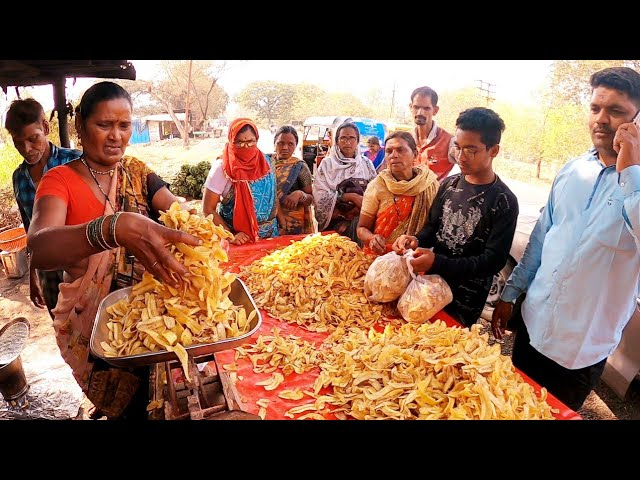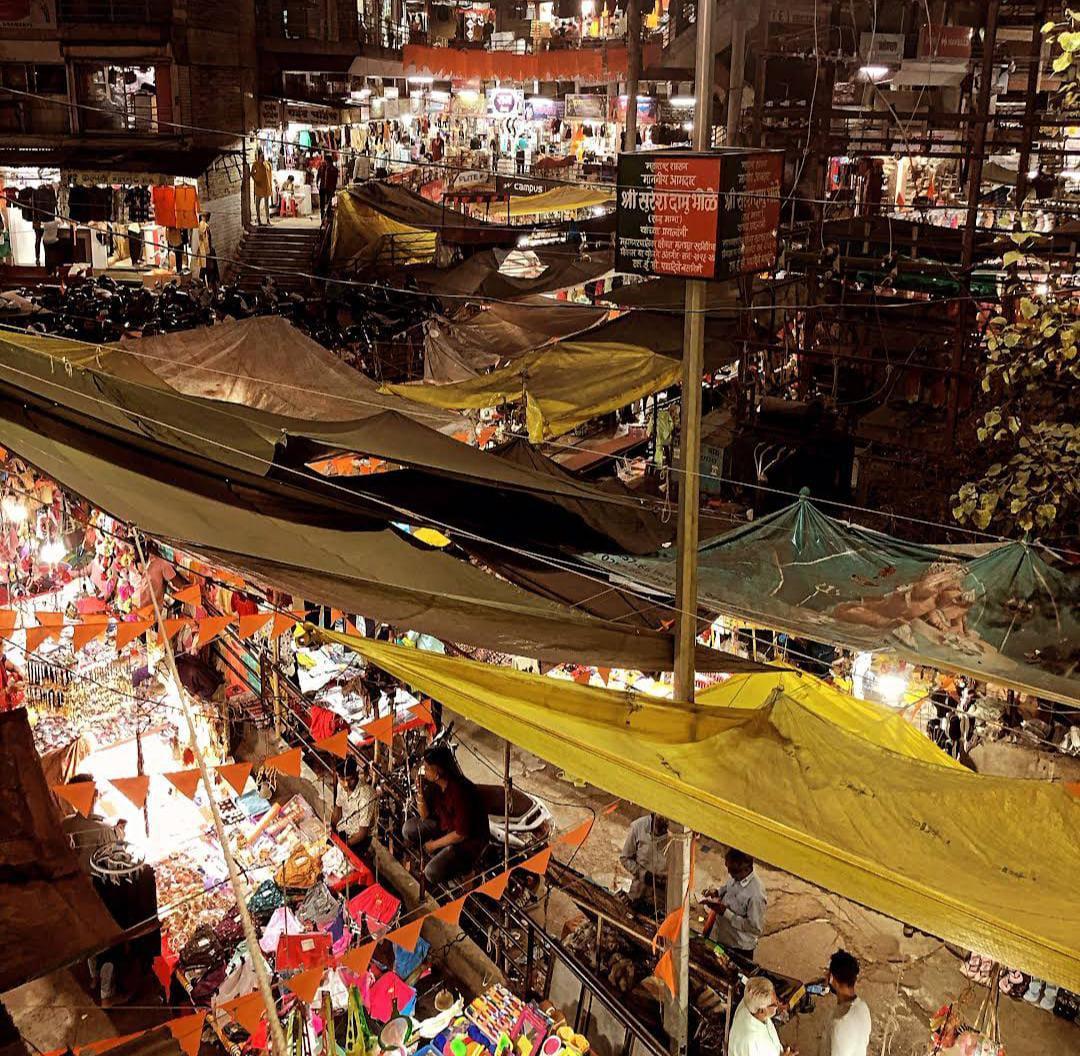Contents
- Jalgaon’s Banana Markets
- Banana Market in Bhusawal
- Bail Bazaar (Cattle Market) in Amalner
- Bamboo crafting at Erandol
- Chopada’s Textile Market
- Chor Bazaar
- Cotton market at Mahatma Gandhi Road
- Godhadi at Saygaon
- Golani Market
- Haats in Erandol and Yawal
- Kelkar Market
- Khandesh Central Mall
- Krishi Utpanna Bazaar Samiti (KUBS)
- Mandir industry at Raver
- Phule Market
- Ruptankar at Parola
- Saraf Bazaar
JALGAON
Markets
Last updated on 22 July 2025. Help us improve the information on this page by clicking on suggest edits or writing to us.
Jalgaon’s Banana Markets
Jalgaon district, often referred to as the “Banana Capital of India,” is the leading producer of bananas in Maharashtra, contributing about 69% of the state’s total output and roughly 16% of India’s national production. Banana cultivation in Jalgaon spans approximately 48,000 hectares, supported by drip irrigation systems and favourable agro-climatic conditions offered by the Satpuda foothills and the Tapi River basin. The region’s bananas, commonly known as Jalgaon bananas or Khandesh bananas, received a Geographical Indication (GI) tag in 2016. This GI tag highlights the uniqueness of the region’s bananas, known for their taste, shelf life, and distinct size. Popular varieties grown in Jalgaon include Dwarf Cavendish, Robusta, Grand Naine, Basrai, and the increasingly preferred Shrimanti variety.
Banana Market in Bhusawal
Bhusawal is known for its banana market, one of the largest in India. Farmers bring their banana produce here to be sold to traders and wholesalers, who distribute them across the country. The market also has stalls selling freshly made banana chips, a popular local snack.

Bail Bazaar (Cattle Market) in Amalner
The Bail Bazaar, located near the Amalner Bus Stand, is a key market for farmers buying and selling livestock, particularly cattle. It plays an important role in the agricultural economy of Jalgaon district.

Bamboo crafting at Erandol
In Erandol, bamboo crafting is an essential local industry. Artisans create a wide variety of bamboo products, including baskets, mats, and decorative items. This craft has been handed down through generations, showcasing the skill and creativity of local craftsmen.
Chopada’s Textile Market
Chopda’s textile market, located along MG Road, specialises in sarees, dress materials, and traditional clothing. It is especially busy during festive seasons when locals and visitors come for special purchases. The market also sells handicrafts and decorative items.
Chor Bazaar
Jalgaon’s Chor Bazaar has existed since the late 19th century, originally serving scrap dealers and second-hand goods traders during British rule. Over time, it became known for selling antiques, books, and used items. Despite its name, which translates to "Thieves' Market," the market operates legally and is a destination for affordable and rare finds.
Cotton market at Mahatma Gandhi Road
The cotton market is centred around areas like Mahatma Gandhi Road and near the Central Bus Stand. Jalgaon’s cotton market is vital to the region, with cotton bales being brought in from surrounding farms. These bales are sold to traders who then supply them to textile mills across the country, particularly in Surat and Ahmedabad. The market is most active during the harvest season, with bustling activity as farmers and traders negotiate prices.
Godhadi at Saygaon
In Saygaon village, the craft of dhurrie/godhadi weaving is well-known for its intricate patterns. While local weavers have passed down their skills through generations, the younger generation is increasingly opting for modern jobs. The availability of cheaper, machine-made rugs has diminished the demand for these handmade dhurries, putting this traditional craft at risk.
Golani Market
Established in 1982, Golani Market started as a trading area and evolved into a wholesale market by 1985. It covers 5 acres and has over 150 traders and wholesalers selling various products, including mobile and electronic items. The market is located near Jalgaon railway station and bus stand and operates from Monday to Saturday.
Haats in Erandol and Yawal
Villages like Erandol and Yawal hold weekly markets, known as haats. These serve as local marketplaces where villagers buy and sell fresh produce, clothes, tools, and other necessities. Haats also provide a social space for people from different villages to meet and interact.
Kelkar Market
Founded by the Kelkar family in 1962, Kelkar Market originally focused on textiles and clothing. Over time, it expanded to include home appliances, electronics, and other goods.
Khandesh Central Mall
As urbanisation increases in Jalgaon, modern shopping malls have emerged. Khandesh Central Mall, located on NH-6 near Kadam Park, offers a variety of retail stores, a food court, and entertainment options, reflecting changing shopping preferences in the city.
Krishi Utpanna Bazaar Samiti (KUBS)
Established in 1938, KUBS Jalgaon was formed as a cooperative market to support agricultural trade. During World War II, it supplied agricultural products to the military. Today, it is one of Maharashtra's largest agricultural markets, trading fruits, vegetables, grains, pulses, and spices. It operates daily except Sundays and sees participation from over 1,500 farmers and traders.
Mandir industry at Raver
Located in Raver taluka, Savda's Rameswaram Mandir Industries is well-known throughout India for its wooden mandir production. Established in 1995 by Prabhudas, Ishwardas, and Kishoredas Janjalkar, the factory specialises in creating exquisite "Devare" (temples). These beautifully crafted wooden shrines are recognised for their durability and lustre, ensuring they retain their quality over the years. The devare produced here have found homes not only across India but also internationally.
Phule Market
Phule Market, established in the 1920s and named after Mahatma Jyotiba Phule in the 1940s, is one of Jalgaon’s oldest trading centres. It spans 5 acres and has over 150 shops and stalls. The market is especially busy during festivals, attracting shoppers from neighbouring cities. It is known for its selection of traditional clothing, including shawls, stoles, embroidered dresses, and lehenga sets.

Ruptankar at Parola
The traditional craft of Ruptankar, involving metal die-making and casting, is primarily practised in Parola. Artisans here have a long-standing heritage of creating intricate metal objects. However, the craft faces a decline as the younger generation shows less interest in this labour-intensive skill. The rise of mass-produced metal goods has further reduced the demand for these handmade creations.
Saraf Bazaar
Saraf Bazaar dates back to the 1750s, when the Saraf community established it for trading gold, silver, and metal goods. By the 1850s, it had become a centre for the precious metal trade. Over the years, the market expanded to include shops selling coins, utensils, and decorative metal items. Today, it remains an important location for gold and silver trading in Jalgaon.
Last updated on 22 July 2025. Help us improve the information on this page by clicking on suggest edits or writing to us.